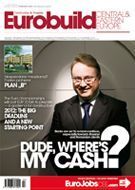Although he was once a handball player, he is now managing a project associated with football. However, he considers this to be a business assignment – not focused on simple profit, but on the wider development of a whole countryThe question is now not ‘if’, but ‘how’ Poland will organize the European football championships. To find out the answer, ‘Eurobuild CEE’ spoke to Marcin Herra, the president of PL.2012 – the company responsible for the coordination of projects necessary for the Euro 2012 tournament and supervising the event. Emil Górecki, ‘Eurobuild CEE’: Are you still being asked if we will make it by 2012? Or perhaps this question is already out of date?Marcin Herra, president of the management board of PL.2012: At this stage the question is certainly out of date. However it was still valid in March of last year, but at the beginning of 2008 we intensified our work considerably and now, after 12 months of hard work, we are perf




























































